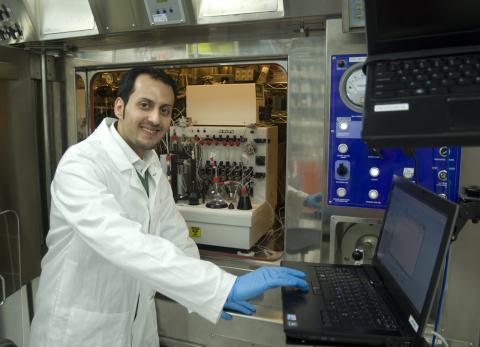
In a white lab coat and blue shoe guards, Mohammed Abusalem looks right at home in the brightly lit halls of TRIUMF's Nuclear Medicine laboratories. In fact, he is over 11,700 km from his home lab at King Faisal Specialist Hospital & Research Centre, Saudi Arabia's national referral centre for oncology patients located in the capital city of Riyadh.
Abusalem is a young radiochemist in the hospital's Cyclotron and Radiopharmaceuticals (C&R) department, a unique facility which supplies radiopharmaceuticals to over 45 nuclear medicine centres in the Kingdom. Recognizing his potential as a talented, dedicated leader, King Faisal Specialist Hospital has sponsored Abusalem to spend a work term with TRIUMF's Nuclear Medicine division. Since January, Abusalem has been lending his expertise to research efforts while gaining an in-depth view of the operations and management of TRIUMF's Nuclear Medicine program.
The connection between TRIUMF and King Faisal Specialist Hospital began several years ago through an international collaboration between TRIUMF scientist Tom Ruth and C&R department leaders. Like TRIUMF, King Faisal's C&R department has a history of excellence in the study, development, and distribution of radiopharmaceuticals. When they opened in 1983, their facility boasted one of the world's first commercial cyclotrons, which supplied radiopharmaceuticals for the hospital's pioneering PET centre. Their original 26.4 MeV cyclotron is still in operation, along with two others (one 11 MeV and the other 30 MeV), producing a wide range of diagnostic and therapeutic radiopharmaceuticals that are shipped daily to twenty cities within Saudi Arabia and the neighbouring United Arab Emirates.
Abusalem joined the C&R department in 2011, after completing his Master of Science in Radiopharmaceuticals and PET Radiochemistry from King's College, London. At the hospital, he led a team in the production of fluoro-deoxy-glucose (FDG), the standard radiotracer used in PET neuroimaging and cancer diagnosis. Abusalem also contributed to various research and development projects at the lab, witnessing the first batch release of the in-house produced Technetium-99m generators, a milestone achievement that reflects the department's leadership and vision to make the Kingdom self-sufficient in its radiopharmaceutical needs.
"Mohammed brings expertise in preclinical imaging as well as a strong work ethic and an insatiable appetite for learning more chemistry," explains Dr. Paul Schaffer, head of TRIUMF's Nuclear Medicine division. "He shares his working experience at King Faisal with the TRIUMF team."
At TRIUMF, Abusalem is working on a project investigating the production and application of radiolabeled amino acid derivatives for imaging oxidative stress by PET. Oxidative stress is an imbalance between free radicals (highly reactive oxygen-containing molecules) and antioxidants. Without a sufficient amount of antioxidants, there is nothing to prevent free radicals from chemically reacting with other cell components (like DNA or lipids), potentially causing serious harm to the cell. The damage caused by oxidative stress can lead to many conditions such as Parkinson's disease, Alzheimer's disease, cancer, heart disease, and others. Thus, developing radiotracers to deliver improved imaging of oxidative stress is a major priority.
Abusalem will continue this research while pursuing his PhD this fall. His expertise will be in high demand upon his return to King Faisal Specialist Hospital, where the need for radiopharmaceuticals – and skilled scientists to produce them – has been steadily growing. The hospital recently added a new Cancer Center with a 300-bed capacity, necessitating the installation of three new PET scanners. Given their close connection with the hospital, the C&D department's main objective is providing patient care, which Abusalem finds both motivating and rewarding.
"It gives me a sense of purpose. At the other end is someone who is in pain, or suffering from cancer," he reflects. "It's satisfying because you're making a difference in their life."
This common goal of making a difference unites both laboratories, whether in rainy Vancouver or sunny Riyadh. The connections forged during Abusalem's work term will be mutually beneficial as both labs work towards advancing nuclear medicine for the benefit of patients all over the world.
-Lindsay Kroes, Communications Assistant
